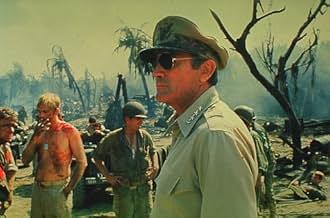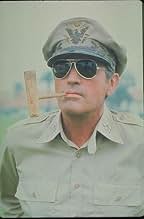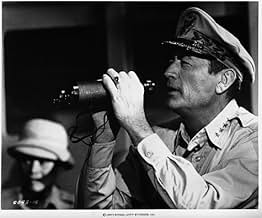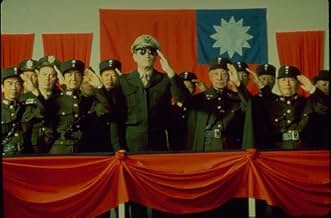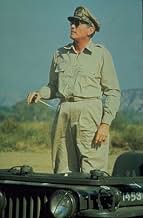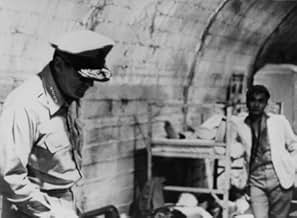IMDb-BEWERTUNG
6,5/10
5468
IHRE BEWERTUNG
Biopic von General Douglas MacArthur über seine Kriegstaten während des 2. Weltkriegs und des Koreakriegs.Biopic von General Douglas MacArthur über seine Kriegstaten während des 2. Weltkriegs und des Koreakriegs.Biopic von General Douglas MacArthur über seine Kriegstaten während des 2. Weltkriegs und des Koreakriegs.
- Regie
- Drehbuch
- Hauptbesetzung
- Auszeichnungen
- 2 Nominierungen insgesamt
Russell Johnson
- Admiral King
- (as Russell D. Johnson)
Empfohlene Bewertungen
Nice biographic film about controversial as well as flamboyant General masterfully played by Gregory Peck and who was Chief of Staff of the United States Army during the 1930s to 1940s and played a prominent role in the Pacific theater during World War II , having received the Medal of Honor for his service in the Philippines Campaign .
Agreeable biopic about the famed general concerning the latter years of his long military career , it starts with his assumption of command of the Philippine army and subsequent retreat ; going on through Inchon landing , China invasion on Korea crossing over parallel 39 and his sacking by President Harry Truman . This is a pretty good film with plenty of emotion , drama , biographic elements , historical events and Peck is spellbinding in the title role . The flick describes efficiently his particular character , complexity and the controversy that surrounded him . Very fine acting by the great Gregory Peck as military chief , he even bears remarkable resemblance to Douglas MacArthur , he had some of his hair shaved off since the real General was quite bald . Peck' outstanding acting arranges to bring alive this historical role , who strode a fine line between demigod and expert battlefield commander . Originally made for TV , it has a long runtime , at 144 minutes , being cut for cinema release . The picture gets magnificent interpretations from prestigious secondaries playing Generals and historical roles such as Kenneth Tobey (Adm. William 'Bull' Halsey) , Gen. George C. Marshall (Ward Costello) , Addison Powell (Fleet Adm. Chester W. Nimitz) , Dick O'Neill (Col. Courtney Whitney) , and Presidents as Dan O'Herlihy (Franklin D Roosevel) , Ed Flanders (Harry Truman) , and John Fujioka (Emperor Hirohito) . This is an engaging warlike drama made at the better for its historic resonance and will appeal to Gregory Peck fans.
Well produced by Frank McCarthy who also financed other warfare movies such as ¨Decision before dawn¨, ¨Single-Handed¨, ¨Fireball Forward¨ and ¨Patton¨ . This solid motion picture was professionally directed by Joseph Sargent , though it holds a certain television style . Sargent is an expert on biography and specialist on historical narrations , as he proved in 'Mandela and Clerk' , 'Abraham , 'McArthur' , 'When the lions roared' which reunited to Stalin , Churchill and again Roosevelt , 'Day one' with Oppenheimer and General General Groves and 'Warm Springs' about Franklin D Roosevelt ; these films don't pack the punch that he achieved in his best movie resulting to be 'Taking of Pelham one , two , three' .
And adding more biographical elements about this military hero : MacArthur was recalled to active duty in 1941 as commander of United States Army Forces in the Far East. A series of disasters followed, starting with the destruction of his air forces on 8 December 1941, and the invasion of the Philippines by the Japanese. MacArthur's forces were soon compelled to withdraw to Bataan, where they held out until May 1942. In March 1942, MacArthur, his family and his staff left nearby Corregidor Island in PT boats and escaped to Australia, where MacArthur became Supreme Commander, Southwest Pacific Area. And General Douglas MacArthur pronounces his famous line : "I will return" . For his defense of the Philippines, MacArthur was awarded the Medal of Honor. After more than two years of fighting in the Pacific, he fulfilled a promise to return to the Philippines. He officially accepted Japan's surrender on 2 September 1945, aboard the USS Missouri anchored in Tokyo Bay, and oversaw the occupation of Japan from 1945 to 1951. As the effective ruler of Japan, he oversaw sweeping economic, political and social changes. He led the United Nations Command in the Korean War until he was removed from command by President Harry S. Truman on 11 April 1951. He later became Chairman of the Board of Remington Rand.
Agreeable biopic about the famed general concerning the latter years of his long military career , it starts with his assumption of command of the Philippine army and subsequent retreat ; going on through Inchon landing , China invasion on Korea crossing over parallel 39 and his sacking by President Harry Truman . This is a pretty good film with plenty of emotion , drama , biographic elements , historical events and Peck is spellbinding in the title role . The flick describes efficiently his particular character , complexity and the controversy that surrounded him . Very fine acting by the great Gregory Peck as military chief , he even bears remarkable resemblance to Douglas MacArthur , he had some of his hair shaved off since the real General was quite bald . Peck' outstanding acting arranges to bring alive this historical role , who strode a fine line between demigod and expert battlefield commander . Originally made for TV , it has a long runtime , at 144 minutes , being cut for cinema release . The picture gets magnificent interpretations from prestigious secondaries playing Generals and historical roles such as Kenneth Tobey (Adm. William 'Bull' Halsey) , Gen. George C. Marshall (Ward Costello) , Addison Powell (Fleet Adm. Chester W. Nimitz) , Dick O'Neill (Col. Courtney Whitney) , and Presidents as Dan O'Herlihy (Franklin D Roosevel) , Ed Flanders (Harry Truman) , and John Fujioka (Emperor Hirohito) . This is an engaging warlike drama made at the better for its historic resonance and will appeal to Gregory Peck fans.
Well produced by Frank McCarthy who also financed other warfare movies such as ¨Decision before dawn¨, ¨Single-Handed¨, ¨Fireball Forward¨ and ¨Patton¨ . This solid motion picture was professionally directed by Joseph Sargent , though it holds a certain television style . Sargent is an expert on biography and specialist on historical narrations , as he proved in 'Mandela and Clerk' , 'Abraham , 'McArthur' , 'When the lions roared' which reunited to Stalin , Churchill and again Roosevelt , 'Day one' with Oppenheimer and General General Groves and 'Warm Springs' about Franklin D Roosevelt ; these films don't pack the punch that he achieved in his best movie resulting to be 'Taking of Pelham one , two , three' .
And adding more biographical elements about this military hero : MacArthur was recalled to active duty in 1941 as commander of United States Army Forces in the Far East. A series of disasters followed, starting with the destruction of his air forces on 8 December 1941, and the invasion of the Philippines by the Japanese. MacArthur's forces were soon compelled to withdraw to Bataan, where they held out until May 1942. In March 1942, MacArthur, his family and his staff left nearby Corregidor Island in PT boats and escaped to Australia, where MacArthur became Supreme Commander, Southwest Pacific Area. And General Douglas MacArthur pronounces his famous line : "I will return" . For his defense of the Philippines, MacArthur was awarded the Medal of Honor. After more than two years of fighting in the Pacific, he fulfilled a promise to return to the Philippines. He officially accepted Japan's surrender on 2 September 1945, aboard the USS Missouri anchored in Tokyo Bay, and oversaw the occupation of Japan from 1945 to 1951. As the effective ruler of Japan, he oversaw sweeping economic, political and social changes. He led the United Nations Command in the Korean War until he was removed from command by President Harry S. Truman on 11 April 1951. He later became Chairman of the Board of Remington Rand.
It is inevitable that MACARTHUR will be compared to PATTON, the other military biopic produced by the late Frank McCarthy. Such comparisons are unfortunate because their subjects are vastly different, albeit controversial figures, and each film takes a different approach in examining their impact on history.
George S. Patton commanded an Army formation in Europe while Douglas Macarthur commanded an entire theater of operation in the Pacific. By his own admission, Patton never had any political ambitions, while MacArthur definitely had such aspirations. Patton's political naivety made him ill-suited as the postwar occupation commander in Bavaria while MacArthur's political astuteness served him well during the occupation of Japan.
Yet both men were great, if iconoclastic military leaders. Patton's brilliant northern pivot during the Battle of the Bulge is matched by the MacArthur's daring amphibious landing at Inchon. And both men believed strongly in their destiny; Patton's belief was based on reincarnation while MacArthur was motivated by following in his illustrious father's footsteps.
Surprisingly, PATTON is the much more succinct, less ambitious film than MACARTHUR. It concentrates on its colorful, mercurial main character during a comparatively brief two-year period between the American defeat at Kasserine Pass in early 1943 to Patton's dismissal prior to his death in late 1945. Although we see Patton's conflict with Omar Bradley, Bernard Montgomery, and Bedell Smith, we never see his interaction with General Dwight Eisenhower, Prime Minister Winston Churchill, or General George Marshall, the U.S. Army's chief of staff.
MACARTHUR is a much more ambitious film, covering nearly a decade from the fall of Bataan in early 1942 to MacArthur's dismissal in 1951. Additionally, MACARTHUR shows a wider range of conflict between MacArthur and such individuals as Admiral Nimitz, General Marshall, ambassador William Averell Harriman, and Presidents Roosevelt and Harry S. Truman.
So, does MACARTHUR match PATTON as a groundbreaking biopic? No, it doesn't.
MACARTHUR lacks the insightful, acerbic screenplay that Francis Ford Coppola and Edmund North supplied PATTON. The direction by TV veteran Joseph Sargent is yeoman-like where the late Franklin J. Schaffner offers a more vigorous, hell-for-leather approach to PATTON. Both films are handsomely mounted productions that serve as a tribute to acumen of the producer McCarthy. Both movies benefit from film scores by the ever-reliable Jerry Goldsmith.
While PATTON has its main character departing in a Valhalla-like denouement, MACARTHUR is book-ended by the legendary speech that the old soldier delivered to the cadet corps at West Point in 1962 as a final valedictory.
At the heart of both films are the extraordinary performances of their lead actors. The late George C. Scott's portrayal of Patton is justly remembered, but Gregory Peck delivers a performance that is both subtle and unapologetic and helps to elevate this often-pedestrian production to a higher level. Peck's portrayal is reminiscent of his work in TWELVE O'CLOCK HIGH, but with the added weight of an additional thirty years of experience and craftsmanship that this great actor brings to bear to this role. Peck is ably supported by Dan O'Herlihy as FDR and the late Ed Flanders as Harry S. Truman.
Finally, I must note the presence of Dr. D. Clayton James, the author of the standard multi-volume biography of MacArthur, who served as this film's technical advisor.
George S. Patton commanded an Army formation in Europe while Douglas Macarthur commanded an entire theater of operation in the Pacific. By his own admission, Patton never had any political ambitions, while MacArthur definitely had such aspirations. Patton's political naivety made him ill-suited as the postwar occupation commander in Bavaria while MacArthur's political astuteness served him well during the occupation of Japan.
Yet both men were great, if iconoclastic military leaders. Patton's brilliant northern pivot during the Battle of the Bulge is matched by the MacArthur's daring amphibious landing at Inchon. And both men believed strongly in their destiny; Patton's belief was based on reincarnation while MacArthur was motivated by following in his illustrious father's footsteps.
Surprisingly, PATTON is the much more succinct, less ambitious film than MACARTHUR. It concentrates on its colorful, mercurial main character during a comparatively brief two-year period between the American defeat at Kasserine Pass in early 1943 to Patton's dismissal prior to his death in late 1945. Although we see Patton's conflict with Omar Bradley, Bernard Montgomery, and Bedell Smith, we never see his interaction with General Dwight Eisenhower, Prime Minister Winston Churchill, or General George Marshall, the U.S. Army's chief of staff.
MACARTHUR is a much more ambitious film, covering nearly a decade from the fall of Bataan in early 1942 to MacArthur's dismissal in 1951. Additionally, MACARTHUR shows a wider range of conflict between MacArthur and such individuals as Admiral Nimitz, General Marshall, ambassador William Averell Harriman, and Presidents Roosevelt and Harry S. Truman.
So, does MACARTHUR match PATTON as a groundbreaking biopic? No, it doesn't.
MACARTHUR lacks the insightful, acerbic screenplay that Francis Ford Coppola and Edmund North supplied PATTON. The direction by TV veteran Joseph Sargent is yeoman-like where the late Franklin J. Schaffner offers a more vigorous, hell-for-leather approach to PATTON. Both films are handsomely mounted productions that serve as a tribute to acumen of the producer McCarthy. Both movies benefit from film scores by the ever-reliable Jerry Goldsmith.
While PATTON has its main character departing in a Valhalla-like denouement, MACARTHUR is book-ended by the legendary speech that the old soldier delivered to the cadet corps at West Point in 1962 as a final valedictory.
At the heart of both films are the extraordinary performances of their lead actors. The late George C. Scott's portrayal of Patton is justly remembered, but Gregory Peck delivers a performance that is both subtle and unapologetic and helps to elevate this often-pedestrian production to a higher level. Peck's portrayal is reminiscent of his work in TWELVE O'CLOCK HIGH, but with the added weight of an additional thirty years of experience and craftsmanship that this great actor brings to bear to this role. Peck is ably supported by Dan O'Herlihy as FDR and the late Ed Flanders as Harry S. Truman.
Finally, I must note the presence of Dr. D. Clayton James, the author of the standard multi-volume biography of MacArthur, who served as this film's technical advisor.
Like the Movies made about Jesus Christ, no one is going to Agree about its complete Accuracy or Decisions concerning the Time Period covered. It's virtually an Impossible Task to present a Total Conception and with Budget and Running Time Restrictions adding to the Limitations.
Most WWII Historians, Armchair or otherwise, tend to give Gregory Peck a nod and are Thankful that His Liberal Leanings did not Cloud His Judgement or Portrayal of the Dynamic and Controversial General.
It is Well Known that MacArthur was Hell Bent on Crafting an Image of Himself as Larger than Life. The Movie has a few Scenes where His Aides Instruct the Newsreel Cameraman to Film the General from a Low Angle, "He loves that technique.". He used Props (corncob pipe) to give Himself a Unique Flair and His Filmed Entrances are Legendary.
MacArthur was not only a Brilliant General, He was a Brilliant Man. His Eloquent way with Words, making His Arguments and displayed Insights with a Poetic Zeal. All of the Aforementioned is seen in this Even Handed Account, originally Made-for TV than Edited for a Theatrical Release.
The Film is Sweeping in Concept, if not in Presentation. It's somewhat Low-Budget renders a Flat Production, but it makes up for it with Peck's Command of the Role and an Appropriately Wordy Script.
Above Average and a Powerful Portrayal of just over a Decade in the Complicated and ever Interesting Leader who was much Loved by the American People, the Philippines, and Japan (for His compassionate and intelligent restructuring of the island's ashes).
President Truman did not Worship the General, as many did and the Movie ends with MacArthur Relieved by the Commander and Chief. It seems even the Accomplished Military Leader was Unable to "Walk On Water", and was Symbolically Crucified by the President.
Most WWII Historians, Armchair or otherwise, tend to give Gregory Peck a nod and are Thankful that His Liberal Leanings did not Cloud His Judgement or Portrayal of the Dynamic and Controversial General.
It is Well Known that MacArthur was Hell Bent on Crafting an Image of Himself as Larger than Life. The Movie has a few Scenes where His Aides Instruct the Newsreel Cameraman to Film the General from a Low Angle, "He loves that technique.". He used Props (corncob pipe) to give Himself a Unique Flair and His Filmed Entrances are Legendary.
MacArthur was not only a Brilliant General, He was a Brilliant Man. His Eloquent way with Words, making His Arguments and displayed Insights with a Poetic Zeal. All of the Aforementioned is seen in this Even Handed Account, originally Made-for TV than Edited for a Theatrical Release.
The Film is Sweeping in Concept, if not in Presentation. It's somewhat Low-Budget renders a Flat Production, but it makes up for it with Peck's Command of the Role and an Appropriately Wordy Script.
Above Average and a Powerful Portrayal of just over a Decade in the Complicated and ever Interesting Leader who was much Loved by the American People, the Philippines, and Japan (for His compassionate and intelligent restructuring of the island's ashes).
President Truman did not Worship the General, as many did and the Movie ends with MacArthur Relieved by the Commander and Chief. It seems even the Accomplished Military Leader was Unable to "Walk On Water", and was Symbolically Crucified by the President.
The movie "MacArthur" begins and ends at Gen. Douglas MacArthur's, Gregory Peck, Alma Mata the US Military Academy of West Point on the Hudson. We see a frail 82 year old Gen.MacArthur give the commencement speech to the graduating class of 1962 about what an honor it is to serve their country. The film then goes into an almost two hour long flashback on Gen. MacArthur's brilliant as well as controversial career that starts in the darkest hours of WWII on the besieged island of Corregidor in the Philippines in the early spring of 1942.
Told to leave he island for Australia before the Japanese military invade it Gen. MacArthur for the very first time in his military career almost disobeys a direct order from his superior US President Franklin D. Roosevelt, Dan O'Herlihy. Feeling that he'll be deserting his men at their greatest hour of need MacArthur reluctantly, together with his wife and young son, did what he was told only to have it haunt him for the reminder of the war. It was that reason, his escape under fire from death or captivity by the Japanese, that drove Gen. MacArthur to use all his influence to get FDR two years later to launch a major invasion of the Philippians, instead of the island of Formosa, to back up his promise to both the Philippine people as well as the thousands of US POWS left behind. That he'll return and return with the might of the US Army & Navy to back up his pledge!
In the two years up until the invasion of the Philippine Islands Gen. MacArther battered the Japanese forces in the South Pafific in a number of brilliantly conceived island hop battles that isolated and starved hundreds of thousands of Japanese troops into surrender. The General did that suffering far less US Military losses then any other allied commander in the War in the Pacific!
It was in 1950/51 in the Korean War that Gen. MacArthur achieved his most brilliant victory as well as his worst military defeat. After outflanking the advancing North Korean Army in the brilliant and perfectly executed, with the invading US Marines suffering less then 100 casualties, back door or left hook invasion of Inchon Gen. MacArther feeling invincible sent the US/UN forces under his command to the very border, along the Yalu River, of Communist Red China. Told by his subordinates that he's facing the threat of a massive ground attack by Communist Chinese troops Gen. MacArthur pressed on anyway until that attack did materialized cutting the US & UN forces to ribbons. The unstoppable wave after wave of attacking Red Chinese troops forced the US/UN forces to retreat in the "Big Bug Out" of 1950 with their very lives, leaving all their equipment behind, across the North Korean border even abandoning the South Korean capital city of Seoul! This turned out to be one of the biggest military disaster in US history with the US forces losing a record, in the Korean War, 1,000 lives on the very first day-Nov. 29/30 1950-of the Communist Chinese invasion!
Shocked and humiliated in what he allowed, due mostly to his own arrogance, to happened MacArthur went on the offensive not against the advancing Communist Chinese and Noth Koreans forces but his own Commander and Chief Pres. Harry S. Truman, Ed Flanders, in him not having the spin or guts to do what has to be done: Launch a full scale invasion of Communist China with nuclear weapons if necessary to prevent its troops from overrunning the Korean Peninsula! For Pres. Truman who had taken just about enough garbage from Gen. MacArthur in him running off his mouth in public in how he was mishandling the war in not going all out, like MacArthur wanted him to, against the Red Chinese this was the last straw! On April 11, 1951 Pres. Truman unceremoniously relived Gen. MacArthur from his command as Supreme Commander of the US/UN forces in Korea! Pres. Truman's brave but very unpopular decision also, by not going along with MacArthur's total war strategy, prevented a Third World War from breaking out with the Soviet Union-Communist China's ally- who at the time-like the US-had the Atomic Bomb! Pres. Truman''s controversial decision to dump the very popular Gen. MacArthur also cost him his re-election in 1952 with his polls numbers so low-in the mid 20's- that he withdrew-in March of that year- from the US Presidential Campaign!
In was Gen. MacArthur's misfortune to be around when the political and military climates in the world were changing in how to conduct future wars. With the horrors of a nuclear war now, in 1950/51, a reality it would have been national suicide to go all out, like Gen. MacArthur wanted to, against the Red Chinese with it very possibly touching off a nuclear holocaust that would engulf not only the US USSR & Red China but the entire world! It was that important reality of future war that Gen. MacArthur was never taught, since the A and H Bomb weren't yet invented, in West Point.
Back to 1962 we can now see that Gen. MacArthur, after finishing his commencement speech at West Point, had become both an older and wiser soldier as well as , since his retirement from the US Military, elder statesman in his feeling about war and the utter futility of it. One thing that Gen. MacArthur was taught at an early age, from his Civil War General dad Douglas MacArthur Sr, that stuck to him all his life was that to a soldier like himself war should be the very last-not first-resort in settling issues between nations. In that it's the soldiers who have to fight and die in it. It took a lifetime, with the advent of the nuclear age, for Gen. MacArthur to finally realize just how right and wise his dad a Congressional Medal of Honor winner, like himself, really was!
Told to leave he island for Australia before the Japanese military invade it Gen. MacArthur for the very first time in his military career almost disobeys a direct order from his superior US President Franklin D. Roosevelt, Dan O'Herlihy. Feeling that he'll be deserting his men at their greatest hour of need MacArthur reluctantly, together with his wife and young son, did what he was told only to have it haunt him for the reminder of the war. It was that reason, his escape under fire from death or captivity by the Japanese, that drove Gen. MacArthur to use all his influence to get FDR two years later to launch a major invasion of the Philippians, instead of the island of Formosa, to back up his promise to both the Philippine people as well as the thousands of US POWS left behind. That he'll return and return with the might of the US Army & Navy to back up his pledge!
In the two years up until the invasion of the Philippine Islands Gen. MacArther battered the Japanese forces in the South Pafific in a number of brilliantly conceived island hop battles that isolated and starved hundreds of thousands of Japanese troops into surrender. The General did that suffering far less US Military losses then any other allied commander in the War in the Pacific!
It was in 1950/51 in the Korean War that Gen. MacArthur achieved his most brilliant victory as well as his worst military defeat. After outflanking the advancing North Korean Army in the brilliant and perfectly executed, with the invading US Marines suffering less then 100 casualties, back door or left hook invasion of Inchon Gen. MacArther feeling invincible sent the US/UN forces under his command to the very border, along the Yalu River, of Communist Red China. Told by his subordinates that he's facing the threat of a massive ground attack by Communist Chinese troops Gen. MacArthur pressed on anyway until that attack did materialized cutting the US & UN forces to ribbons. The unstoppable wave after wave of attacking Red Chinese troops forced the US/UN forces to retreat in the "Big Bug Out" of 1950 with their very lives, leaving all their equipment behind, across the North Korean border even abandoning the South Korean capital city of Seoul! This turned out to be one of the biggest military disaster in US history with the US forces losing a record, in the Korean War, 1,000 lives on the very first day-Nov. 29/30 1950-of the Communist Chinese invasion!
Shocked and humiliated in what he allowed, due mostly to his own arrogance, to happened MacArthur went on the offensive not against the advancing Communist Chinese and Noth Koreans forces but his own Commander and Chief Pres. Harry S. Truman, Ed Flanders, in him not having the spin or guts to do what has to be done: Launch a full scale invasion of Communist China with nuclear weapons if necessary to prevent its troops from overrunning the Korean Peninsula! For Pres. Truman who had taken just about enough garbage from Gen. MacArthur in him running off his mouth in public in how he was mishandling the war in not going all out, like MacArthur wanted him to, against the Red Chinese this was the last straw! On April 11, 1951 Pres. Truman unceremoniously relived Gen. MacArthur from his command as Supreme Commander of the US/UN forces in Korea! Pres. Truman's brave but very unpopular decision also, by not going along with MacArthur's total war strategy, prevented a Third World War from breaking out with the Soviet Union-Communist China's ally- who at the time-like the US-had the Atomic Bomb! Pres. Truman''s controversial decision to dump the very popular Gen. MacArthur also cost him his re-election in 1952 with his polls numbers so low-in the mid 20's- that he withdrew-in March of that year- from the US Presidential Campaign!
In was Gen. MacArthur's misfortune to be around when the political and military climates in the world were changing in how to conduct future wars. With the horrors of a nuclear war now, in 1950/51, a reality it would have been national suicide to go all out, like Gen. MacArthur wanted to, against the Red Chinese with it very possibly touching off a nuclear holocaust that would engulf not only the US USSR & Red China but the entire world! It was that important reality of future war that Gen. MacArthur was never taught, since the A and H Bomb weren't yet invented, in West Point.
Back to 1962 we can now see that Gen. MacArthur, after finishing his commencement speech at West Point, had become both an older and wiser soldier as well as , since his retirement from the US Military, elder statesman in his feeling about war and the utter futility of it. One thing that Gen. MacArthur was taught at an early age, from his Civil War General dad Douglas MacArthur Sr, that stuck to him all his life was that to a soldier like himself war should be the very last-not first-resort in settling issues between nations. In that it's the soldiers who have to fight and die in it. It took a lifetime, with the advent of the nuclear age, for Gen. MacArthur to finally realize just how right and wise his dad a Congressional Medal of Honor winner, like himself, really was!
This is a sound and thoughtful performance by Peck, who was saddled by a Ciceronian script, some of it presumably emanating from MacArthur himself.
MacArthur's conviction that war is a great evil is convincingly portrayed, as is the relish of a general doing the only thing for which he was trained: the prosecution of war to the utmost severity.
The real heroes of this movie are the politicians. Not just Roosevelt, but also the caricature of Truman, and the never seen or heard Eisenhower (a good clerk according to Peck's MacArthur). This movie reminded me that it is as important for a politician to compromise as for it is a general to combat.
MacArthur's greatest opportunity was to become military ruler of a defeated Japan, for 3 years. It appears that he seized this to some good effect. He later claimed that:
"The Japanese people since the war have undergone the greatest reformation recorded in modern history. With a commendable will, eagerness to learn, and marked capacity to understand, they have from the ashes left in war's wake erected in Japan an edifice dedicated to the supremacy of individual liberty and personal dignity, and in the ensuing process there has been created a truly representative government committed to the advance of political morality, freedom of economic enterprise, and social justice."
In this one seems to hear the tone of a general boasting about his troops. That is no small thing: for a fighter to impose a peace, on more or less unconditional terms, and seek to reconstitute, rather than to humiliate. He would have made an abominably bad politician, but as interim ruler he ain't done so bad, according to this thoughtful movie.
7/10 for movie making; 8/10 for thought provocation.
David Broadhurst
MacArthur's conviction that war is a great evil is convincingly portrayed, as is the relish of a general doing the only thing for which he was trained: the prosecution of war to the utmost severity.
The real heroes of this movie are the politicians. Not just Roosevelt, but also the caricature of Truman, and the never seen or heard Eisenhower (a good clerk according to Peck's MacArthur). This movie reminded me that it is as important for a politician to compromise as for it is a general to combat.
MacArthur's greatest opportunity was to become military ruler of a defeated Japan, for 3 years. It appears that he seized this to some good effect. He later claimed that:
"The Japanese people since the war have undergone the greatest reformation recorded in modern history. With a commendable will, eagerness to learn, and marked capacity to understand, they have from the ashes left in war's wake erected in Japan an edifice dedicated to the supremacy of individual liberty and personal dignity, and in the ensuing process there has been created a truly representative government committed to the advance of political morality, freedom of economic enterprise, and social justice."
In this one seems to hear the tone of a general boasting about his troops. That is no small thing: for a fighter to impose a peace, on more or less unconditional terms, and seek to reconstitute, rather than to humiliate. He would have made an abominably bad politician, but as interim ruler he ain't done so bad, according to this thoughtful movie.
7/10 for movie making; 8/10 for thought provocation.
David Broadhurst
Wusstest du schon
- WissenswertesAlthough Gregory Peck had reservations about the film's script and production quality, he later called it one of his favorite roles, if not one of his favorite movies.
- PatzerShortly after MacArthur's escape from the Philippines in the spring of 1942, he complains that the President and the Chiefs of Staff are not sending him enough troops, supplies, and equipment to carry on his war against the Japanese. He says that priorities are instead being given to commanders in other theaters, including Gen Patton in North Africa. However, Patton's troops did not arrive in Africa until November 1942.
- Zitate
President Sergio Osmena: You see, General, my people are going to laugh if I fell in deep water. I cannot swim!
General Douglas MacArthur: That's not so bad, Mr. President. Everyone's about to see that I can't walk on water.
- Alternative VersionenThe UK DVD issue omits the sequence where MacArthur meets Emperor Hirohito, but instead, adds to the ending. The film now ends with MacArthur and his wife watch a TV transmission of the presidential inauguration of Eisenhower MacArthur's comment: "He will turn out fine. He was the best clerk that ever served under me"), followed by the end of MacArthur's farewell speech at West Point. The subsequent credits starts to roll slightly earlier than previously.
Top-Auswahl
Melde dich zum Bewerten an und greife auf die Watchlist für personalisierte Empfehlungen zu.
- How long is MacArthur?Powered by Alexa
Details
Box Office
- Budget
- 9.000.000 $ (geschätzt)
- Laufzeit2 Stunden 10 Minuten
- Sound-Mix
- Seitenverhältnis
- 1.85 : 1
Zu dieser Seite beitragen
Bearbeitung vorschlagen oder fehlenden Inhalt hinzufügen

Oberste Lücke
By what name was MacArthur - Held des Pazifik (1977) officially released in India in English?
Antwort
